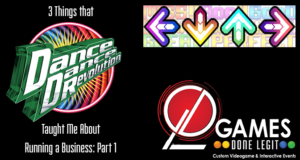NPR recently featured an article about how videogames like the Legend of Zelda series has helped a young man stay connected to his dad, who passed away when he was in college. His dad got him his first Zelda game when he was 6. Since then, virtual worlds have provided both an escape but also a source of strength. He touched on a concept that I think retro games are uniquely suited for — how videogames like Duck Hunt help our mental health (I’ll explain).
“Capability isn’t succeeding or failing, it’s failing until you succeed. The challenge is the purpose. The journey is growth.”
For me, it’s not an external loss but repeated internal worry that’s defined my life the last two years, and I’ve needed every source of positivity I could find — be it from family, friend, modern medicine, or videogame — to get me through.

The Zelda 1 tagline is “Experience the Challenge of Endless Adventure”. Sounds kinda like real life.
Life Challenges, Videogames, and Dealing
It’s hard to not only face the obvious challenges in your adult life (kids, career, etc.), but also all deal with the unseen stuff you’ve buried in your heart because you don’t want to deal with painful feelings from your past.
The more I continue with counseling since my brain surgery a year and a half ago, the more I’ve been had to step back and take stock of my feelings. And with ADHD, it’s easy to simply ride the emotional roller coaster you’re permanently on rather than step off occasionally and think about why you’re on it in the first place.
I don’t play modern videogames for a number of reasons. One is that games are designed now to be your buddy. They almost always want you to feel relaxed and accomplished and to not get frustrated. This is all great for most people.
You know what happens in ’80s and ’90s games if you stop paying attention for a second and a half? You die. That makes them uniquely thrilling and even helpful, especially when they combine a physical and a mental engagement.
Our Brain Likes the Physical & Mental Challenge of Lightgun Games
A great example is lightgun videogames. Obviously you know Duck Hunt and probably Big Buck Hunter, and the basic premise of this article still applies. But one of the greatest shooters ever is SEGA’s 1996 shooter House of the Dead (and it’s 1999 sequel), which just was remade for modern systems. It’s sometimes about facing a zombie hoard that’s helpful when life has me down and out.

In HotD, your fiancee is a researcher at a creepy ol’ mansion of a mad doctor bent on destroying the world with genetically engineered, zombie-like creatures (hey, we all need a hobby).
So you and your agent bestie have to go in and save them all (at least, the ones you don’t accidentally shoot). While you’re at it, stop Dr. Curien before his masterpiece escapes the manor and lays waste to the world while his badass musical theme plays (yes, this is me playing).
Maybe all he really needs is a hug.
Lightgun games are the closet thing you have in classic gaming to virtual reality. They take place all in first person, and there are no buttons or controllers to indirectly influence the action. You are directly being attacked by vicious monsters.
Forget mini-nukes, rockets, shotguns, machine guns, and autofire. Your wimpy six-shooter is all you get, and it takes a perfect headshot to down even basic enemies in one hit.
The fatigue in your arms and trigger finger are far more deadly to you than any creature in the mansion, especially as you get older! (I don’t remember fighting a battle of wills with my right index during the final boss when I was 15.)

The SEGA mid-’90s lightgun is ergonomically perfect, but every year I take more of a beating each time I play these games!
Why the Arcade Experience is Good for our Brain
Arcade experiences are hype because you don’t want to lose and waste actual money, so there’s a real-life cost for failure! Even on a home console, you’re limited in continues and don’t want to feel the failure of “Game Over” after all that work to get so far. Your body seriously feels like you went through something when you’re done.
Because I talk so much about Dance Dance Revolution, my counselor shared with me that any activity that engages us both visually and physically is exponentially engaging and healthy for our brains. This (partly) explains why people like me are still playing DDR much more motivating than simply working a treadmill. (The other part of why is just that I’m weird, probably.)
DDR gave me something to work toward after my surgery. It paid off! Out of the millions of DDR players, I’m told only 100-200 in the world can clear this!
Videogames Provide Me with a Sense of Control. It Carries Over to Real Life
Experiencing the 30-to-60-minute burst of intense focus you get from many retro videogames can help me feel of stability, accomplishment and relief. With ADHD, there are so many things I want to do, create, and do for others, but prioritizing is absolutely crippling. If left unchecked, I can be overwhelmed and paralyzed into complete inaction.
In a lightgun game, you can forget the nebulous gray-area problems of life for half an hour. Facing an evil legion only you can overcome — combined with the physical energy and mental focus you need to expend — provides a concrete, black-and-white, fun goal for you to achieve.
Additionally, it gives me a concrete thing to fight that can serve as an embodiment of my fears and anxieties. I know I didn’t really save the world when I’ve exited the mansion victorious, but that small sense of reward and clarity I have afterwards is real. I can carry that over with me to next day of life and work.
As I’ve experienced recurring anxiety and alarm related to my brain experience, I need all the help I can get to clear my head, snap out of negative emotional loops. It helps me remember that I have agency and can accomplish the things I work toward and set my mind to.
I know a lot of people just watch Field of Dreams or Steel Magnolias or something when they need a cry. But more often than not I need to feel like an active participant on a journey through hell to healing — House of the Dead, literally!
I’m Always Happy to Hear YOUR Inspiring Story about Videogames!
I hope it was fun to look at how videogames like Duct Hunt help our mental health. If you have similar stories of games that have helped you through tough times, I’d love to hear from you through my website or Instagram, Facebook or Twitter! I’m always looking to share stories like the NPR author I shared in this piece. See you next time!


